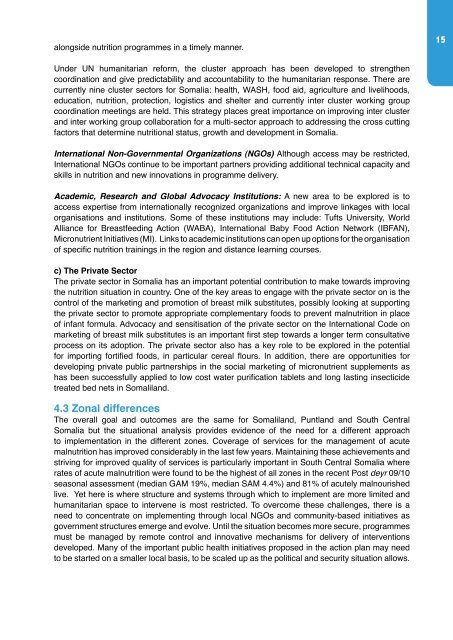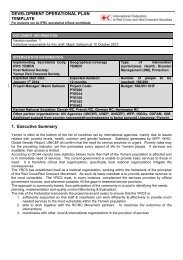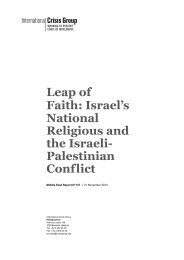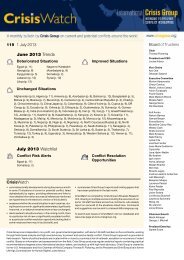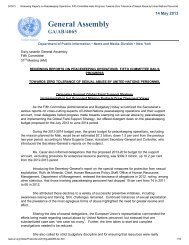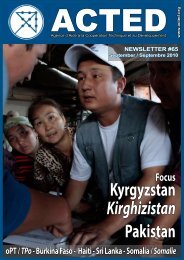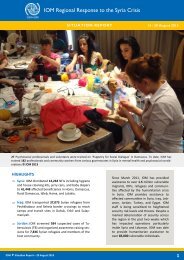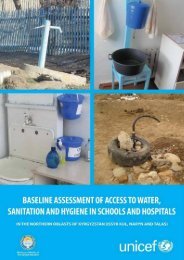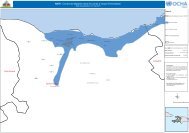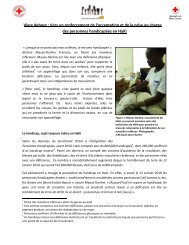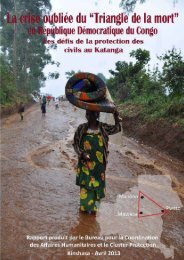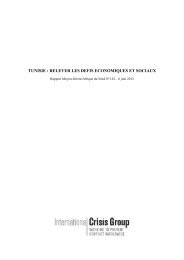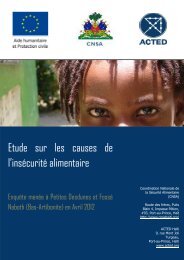SOMALI NUTRITION STRATEGY 2011 – 2013 - ReliefWeb
SOMALI NUTRITION STRATEGY 2011 – 2013 - ReliefWeb
SOMALI NUTRITION STRATEGY 2011 – 2013 - ReliefWeb
Create successful ePaper yourself
Turn your PDF publications into a flip-book with our unique Google optimized e-Paper software.
alongside nutrition programmes in a timely manner.<br />
15<br />
Under UN humanitarian reform, the cluster approach has been developed to strengthen<br />
coordination and give predictability and accountability to the humanitarian response. There are<br />
currently nine cluster sectors for Somalia: health, WASH, food aid, agriculture and livelihoods,<br />
education, nutrition, protection, logistics and shelter and currently inter cluster working group<br />
coordination meetings are held. This strategy places great importance on improving inter cluster<br />
and inter working group collaboration for a multi-sector approach to addressing the cross cutting<br />
factors that determine nutritional status, growth and development in Somalia.<br />
International Non-Governmental Organizations (NGOs) Although access may be restricted,<br />
International NGOs continue to be important partners providing additional technical capacity and<br />
skills in nutrition and new innovations in programme delivery.<br />
Academic, Research and Global Advocacy Institutions: A new area to be explored is to<br />
access expertise from internationally recognized organizations and improve linkages with local<br />
organisations and institutions. Some of these institutions may include: Tufts University, World<br />
Alliance for Breastfeeding Action (WABA), International Baby Food Action Network (IBFAN),<br />
Micronutrient Initiatives (MI). Links to academic institutions can open up options for the organisation<br />
of specific nutrition trainings in the region and distance learning courses.<br />
c) The Private Sector<br />
The private sector in Somalia has an important potential contribution to make towards improving<br />
the nutrition situation in country. One of the key areas to engage with the private sector on is the<br />
control of the marketing and promotion of breast milk substitutes, possibly looking at supporting<br />
the private sector to promote appropriate complementary foods to prevent malnutrition in place<br />
of infant formula. Advocacy and sensitisation of the private sector on the International Code on<br />
marketing of breast milk substitutes is an important first step towards a longer term consultative<br />
process on its adoption. The private sector also has a key role to be explored in the potential<br />
for importing fortified foods, in particular cereal flours. In addition, there are opportunities for<br />
developing private public partnerships in the social marketing of micronutrient supplements as<br />
has been successfully applied to low cost water purification tablets and long lasting insecticide<br />
treated bed nets in Somaliland.<br />
4.3 Zonal differences<br />
The overall goal and outcomes are the same for Somaliland, Puntland and South Central<br />
Somalia but the situational analysis provides evidence of the need for a different approach<br />
to implementation in the different zones. Coverage of services for the management of acute<br />
malnutrition has improved considerably in the last few years. Maintaining these achievements and<br />
striving for improved quality of services is particularly important in South Central Somalia where<br />
rates of acute malnutrition were found to be the highest of all zones in the recent Post deyr 09/10<br />
seasonal assessment (median GAM 19%, median SAM 4.4%) and 81% of acutely malnourished<br />
live. Yet here is where structure and systems through which to implement are more limited and<br />
humanitarian space to intervene is most restricted. To overcome these challenges, there is a<br />
need to concentrate on implementing through local NGOs and community-based initiatives as<br />
government structures emerge and evolve. Until the situation becomes more secure, programmes<br />
must be managed by remote control and innovative mechanisms for delivery of interventions<br />
developed. Many of the important public health initiatives proposed in the action plan may need<br />
to be started on a smaller local basis, to be scaled up as the political and security situation allows.


